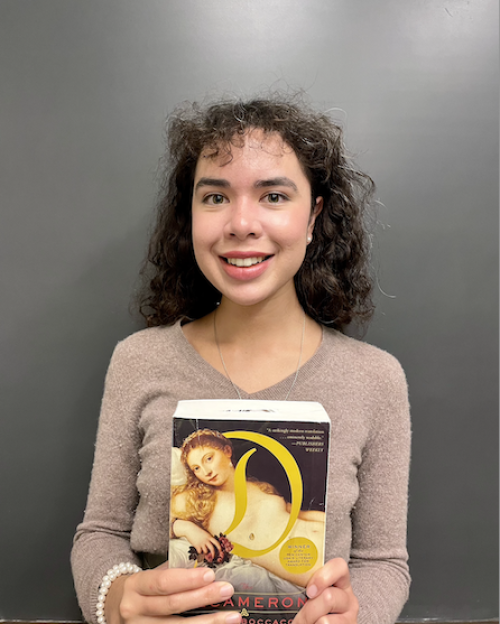Grace Aiono ‘26 has been awarded this year’s Giuseppe Velli Prize by the American Boccaccio Association (ABA) for the best undergraduate student essay on the works of Giovanni Boccaccio.
The prize honors the extensive contributions of Giuseppe Velli (1928-2013), a renowned Boccaccio scholar whose work remains fundamental in Italy and North America today. It is awarded for the best essay submitted by an undergraduate student in any American or Canadian University, or by a recent graduate who earned a B.A. during the year prior to submission.
The ABA honored Aiono’s essay "How Talano Tricks His Wife: The Violence of Rhetoric in 'Decameron 9.7'" for exploring the gendered components of this 14th-century Italian masterpiece.
"Decameron 9.7," one of the 100 stories within "the Decameron," is the story of Margarita, a recalcitrant wife who, because she rebels against her husband Talano’s advice, is attacked by a wolf and horribly disfigured.
To Aiono, however, the true story of "Decameron 9.7" rests in its rhetoric. Aiono argues that Margarita is at first a rebel, but then a victim of her husband’s manipulation.
In her winning essay, Aiono points to the repetition of the word "advice" in the text. She highlights that Talano repeats the word "advice" to Margarita despite her well-known reputation as an "oppositional" woman who "utterly refused to follow other people’s advice." Aiono argues that Talano knows that Margarita will disobey his advice because he knows she acts contrary to his advice; therefore, he is setting her up for contradiction.
Aiono’s perspective challenges the narrative that most scholars uphold about this story, and she agrees with embracing ambiguous information in "the Decameron," "that it’s not really possible to call this a feminist or misogynist text" because "we miss out on things when we try to approach this text, but other texts as well, from only a feminist perspective," she said.
Instead of a singular point of view, Aiono advocates for examining every detail within a story, "for within these patterns lie deviations, contradictions, lessons, and questions." She asserts, "If we only focus on the women, we’re not necessarily seeing who’s acting. Who is speaking to her? What are they allowing her to say, or rather not to say?"
Aiono’s essay highlights Talano "not because I’m less interested in Margarita, I’m actually more interested in her. I’m interested in what he [Talano] does to her."
Her modern viewpoint on "the Decameron" resonates with a younger generation who are possibly “a lot more conscious that women can be manipulated through speech," Aiono said.
Aiono’s essay builds on the practice of ethical reading, which she learned from Marilyn Migiel, professor of Romance studies and author of the prize-winning book "The Ethical Dimension of the ‘Decameron.'"
"We can read things that are there. But we can also have things that we want to see in a text that aren’t necessarily there," Aiono said. To be ethical, she concludes, "It’s up to us to use this confluence of voices, which is the text itself, and what other people are saying about the text, and I would even say, what the voice inside your head is saying to you about the text."
Migiel, a former president of the ABA, encouraged Aiono to apply for the prize.
"Last April, I quickly realized that Grace’s reading of 'Decameron 9.7' was strikingly original and indicative of high-level thinking," Migiel said. "When I had her submit her essay for the Velli Prize, I was 99% sure that she would win. For a first-year student to win the prize is remarkable. It is a great honor for Grace and for Cornell."
Hannah Mitchell is a communications assistant for The College of Arts & Sciences.




